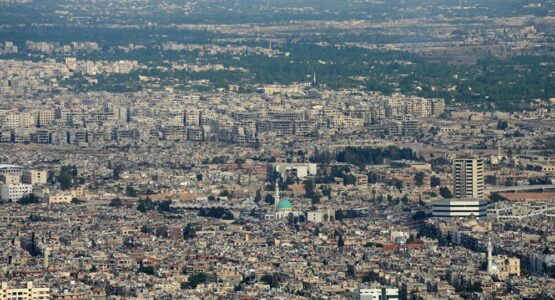
Militant Hamas group back in Damascus after years of tension
Two senior officials from the Palestinian militant Hamas group visited Syria’s capital Wednesday in the first such visit since the faction was forced to leave the war-torn country a decade ago over backing armed opposition fighters.
The visit appears to be a first step toward full reconciliation between Hamas and the Syrian government and follows a monthslong mediation by Iran and Lebanon’s militant Hezbollah group — both key backers of Syrian President Bashar Assad. Over the years, Tehran and the Iran-backed Hezbollah have maintained their relations with Hamas, despite Assad’s rift with the Palestinian militants.
Before the rift, Hamas had long kept a political base in Syria, receiving Damascus’ support in its campaign against Israel. Hamas’ powerful leadership-in-exile remained in Syria even after the group took power in the Gaza Strip in 2007.
But when Syria tipped into civil war, Hamas broke with Assad and sided with the rebels fighting to oust him. The rebels are largely Sunni Muslims, like Hamas, and scenes of Sunni civilian deaths raised an outcry across the region against Assad, who belongs to the Alawites, a minority Shiite sect in Syria.
Over the past few years, Syrian government forces have captured much of Syria with the help of Assad’s main backers Russia and Iran. The 11-year conflict has killed hundreds of thousands, destroyed large parts of the country and displaced half of Syria’s pre-war population of 23 million, including more than 5 million refugees outside the country.
“The new rapprochement is a belated recognition on the part of Hamas that all roads to continuing Iranian assistance lead to Damascus,” said Fawaz Gerges, professor of international relations and Middle Eastern politics at the London School of Economics. “Hamas bit the bullet. Assad’s political gain is Hamas’ moral loss.”
On Wednesday, Khalil al-Hayeh, a senior figure in Hamas’ political branch, and top Hamas official Osama Hamdan were among several officials representing different Palestinian factions who were received by Assad.
Al-Hayeh has regularly visited Beirut over the years, meeting with Hezbollah leader Hassan Nasrallah; their last meeting was in August.
After Wednesday’s meeting, al-Hayeh said Assad was “keen on Syria’s support to the Palestinian resistance” and called his visit a “glorious day.”
“God willing, we will turn the old page and look for the future,” al-Hayeh said, adding that Hamas is against any “Zionist or American aggression on Syria.”
Israel has carried out hundreds of airstrikes around Syria over the past years, mainly targeting Iran-backed fighters.
Assad told the Palestinian delegation that “despite the war that Syria is being subjected to, it did not change its stance of backing resistance by all forms,” state news agency SANA reported. He added that the Syria “that everyone knew before and after the war will not change and will continue as a supporter of resistance” movements.
Hamas’ re-establishing of a Damascus base would mark its rejoining the so-called Iran-led “axis of resistance” as Tehran works to gather allies at a time when talks with world powers over Iran’s nuclear program are stalled.
The move by Hamas also comes after Turkey restored relations with Israel and after some Arab states, including the United Arab Emirates and Bahrain, normalized relations with Hamas’ archenemy Israel.
“This is a marriage of convenience, a tactical alliance based on common interest,” said Gerges, adding that Hamas has become dependent on Iranian aid and has little support from Arab governments. Hezbollah has also provided Hamas with much-needed logistical support, he said.
The pro-government Al-Watan daily says Damascus will be reconciling with the “resistance branch” of Hamas and not the Muslim Brotherhood faction — an apparent reference to Hamas leader Khaled Mashaal who was once based in Damascus but is now in Qatar.
At the start of the Syrian conflict, Hamas’ leadership in exile remained largely silent. But tensions grew with the increased bloodshed, and finally in January 2012, Mashaal left Syria to Qatar, one of the main backers of fighters trying to remove Assad from power.
The following September, Mashaal gave a speech in Turkey, also a backer of the opposition, proclaiming, “we welcome the revolution of the Syrian people who are seeking freedom and independence” and that “the pure blood of these great people is being shed” because they seek democracy.
Within hours, Syrian authorities sealed up all Hamas offices in the country and expelled its members to Lebanon. They have not been allowed back since until Wednesday’s visit.
Al-Hayeh said the decision to come to Damascus has the support of all Hamas leadership. In an apparent reference to Mashaal, al-Hayeh said that “unilateral behaviors by some Hamas members were not approved by the group.”
“We are here in Syria today representing the leadership that made this decision,” he said about reconciling with Damascus.
Meanwhile, Hamas announced that Saudi Arabia released a Hamas official after three years in custody.
Mohammed Al-Khoudary, a longtime Hamas official who had been based in the Saudi capital Riyadh, was on his way to Jordan, which agreed to host him, said another Hamas official, Izzat al-Reshq.
Al-Khoudary was among dozens of Palestinians and Jordanians the kingdom rounded up in 2019 in a massive crackdown on the Islamic group’s supporters. At the time, Hamas said the detainees were arrested for “collecting donations for Palestinian charities, not on security charges.”
In 2021, Al-Khoudary, 84, was sentenced to 15 years on terrorism charges that the kingdom never revealed. Other detainees received sentences of prison terms up to 22 years. Al-Khoudary’s sentence was reduced to six years.
Source: Abcnews





